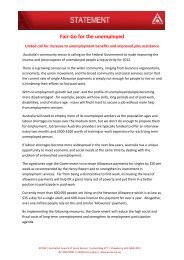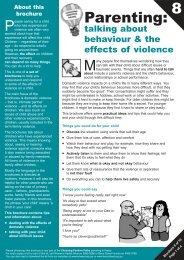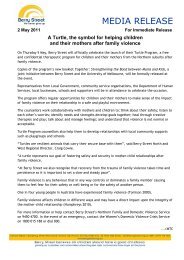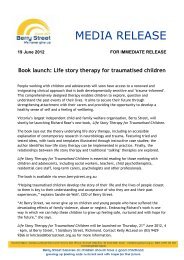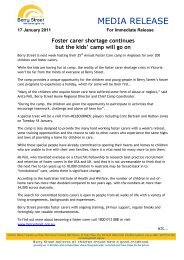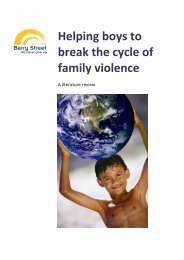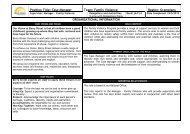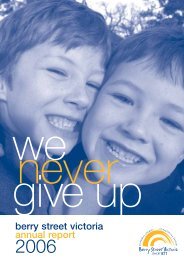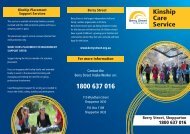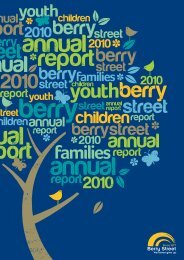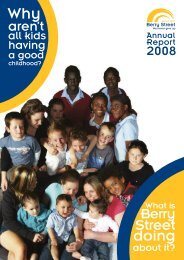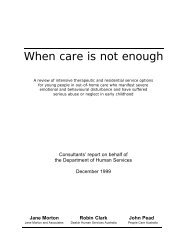Take Two - Third Evaluation Report More than Words ... - Berry Street
Take Two - Third Evaluation Report More than Words ... - Berry Street
Take Two - Third Evaluation Report More than Words ... - Berry Street
You also want an ePaper? Increase the reach of your titles
YUMPU automatically turns print PDFs into web optimized ePapers that Google loves.
The training, research and Aboriginal teams have<br />
been able to attract other sources of funding through<br />
government, philanthropic trusts, fee for training, other<br />
contributions from partner organisations and private<br />
philanthropists to expand the impact of the in uence of<br />
<strong>Take</strong> <strong>Two</strong>. A number of these include:<br />
• Training for youth justice, permanent care, family<br />
support and schools;<br />
• Research and publications for Of ce of Child Safety<br />
Commissioner (OCSC);<br />
• Extension of research strategy, such as regarding<br />
Aboriginal children’s social and emotional wellbeing<br />
and the speech and language needs of children who<br />
have experienced abuse and neglect;<br />
• Development of models for trauma-sensitive practice<br />
in other settings, such as youth justice custodial<br />
settings and residential care.<br />
These additional sources of funding and the projects<br />
they have supported have expanded the in uence<br />
of <strong>Take</strong> <strong>Two</strong> and its ability to impact on the broader<br />
system. These projects and other initiatives include<br />
those in an international context, national context, state<br />
context, organisational context, program governance,<br />
management and program practice (as seen in<br />
Appendices <strong>Two</strong> to Seven).<br />
As shown in Appendix <strong>Two</strong>, the pro le of <strong>Take</strong> <strong>Two</strong><br />
is developing on an international level. This has<br />
been through conference presentations, publications<br />
in international journals and developing networks<br />
and collaborative work with organisations in other<br />
countries, such as the ChildTrauma Academy and the<br />
University of Washington. This creates opportunities for<br />
communication with researchers and theorists regarding<br />
the nature of the client group and research-informed<br />
interventions. <strong>Take</strong> <strong>Two</strong>’s growing pro le at a national<br />
level is seen in Appendix Three. <strong>Take</strong> <strong>Two</strong>’s emerging<br />
pro le and networks increases the opportunities for the<br />
clinical work within <strong>Take</strong> <strong>Two</strong> to be informed by and<br />
inform the international and national research, policy<br />
and practice regarding traumatised children.<br />
In addition to local conferences and publications<br />
within the Victorian statewide context, <strong>Take</strong> <strong>Two</strong> has<br />
contributed to the policy, program development and<br />
practice related to the child protection, out-of-home<br />
care, youth justice, education and mental health elds.<br />
Examples of these contributions are found in Appendix<br />
Four.<br />
Appendix Five provides examples of some of the<br />
organisational activities within <strong>Berry</strong> <strong>Street</strong> related to<br />
<strong>Take</strong> <strong>Two</strong>, such as administrative restructures and the<br />
expansion of the work of the Aboriginal Team across<br />
other parts of <strong>Berry</strong> <strong>Street</strong>. <strong>Take</strong> <strong>Two</strong> has continued<br />
to strengthen its governance and other aspects of the<br />
underlying management structures as seen in Appendix<br />
Six. Most notably has been the addition of VACCA to<br />
the partnership of <strong>Take</strong> <strong>Two</strong>. Appendix Six also lists the<br />
beginning of the process for accreditation with ACHS<br />
involving program certi cation. This is an important<br />
aspect of the quality assurance and improvement<br />
processes. Appendix One provides a description of<br />
the ACHS standards relevant to <strong>Take</strong> <strong>Two</strong> and the<br />
activities conducted by <strong>Take</strong> <strong>Two</strong> to meet or work<br />
towards meeting these standards. The ACHS framework<br />
provides a means of monitoring and measuring a health<br />
18<br />
organisation’s endeavours towards quality assurance<br />
and improvement. <strong>Take</strong> <strong>Two</strong> was successfully certi ed<br />
in 2007 and then accredited as a health service with<br />
ACHS in late 2009<br />
A structural change that occurred in 2008 was<br />
the establishment of the knowledge area which<br />
brought together the areas of research, information<br />
management and practice development and training.<br />
This integration under the one management structure<br />
was in recognition of their inter-connectedness and<br />
to ensure greater cohesion. It aims to facilitate the<br />
clinicians’ ability to access client information and to<br />
utilise outcome measures, build knowledge, explore<br />
new knowledge and utilise research ndings.<br />
Finally, Appendix Seven provides examples of some<br />
of the tasks and activities by <strong>Take</strong> <strong>Two</strong> in improving<br />
its therapeutic, research, training and program<br />
development. The details of some of these initiatives are<br />
discussed later in this chapter. Many of the initiatives in<br />
relation to the work with Aboriginal children and the<br />
community are discussed in more detail in Chapter 5.<br />
The following sections of this chapter spotlight some<br />
of these activities in more detail, including the infant<br />
mental health project, the neuropsychology project and<br />
the <strong>Take</strong> <strong>Two</strong> training strategy. For brevity, some of the<br />
data relating to the outcome measures are presented in<br />
Appendices Eight to Eleven.<br />
3.5 Structures and other inputs of<br />
<strong>Take</strong> <strong>Two</strong><br />
As mentioned in Chapter 2 on the evaluation framework,<br />
an evaluation should report on a range of elements of<br />
the program including inputs. In addition to describing<br />
the client group, inputs include staff, teams, materials,<br />
equipment and facilities. Training of <strong>Take</strong> <strong>Two</strong> staff is a<br />
signi cant input and is described later in this chapter.<br />
3.5.1 Structure of <strong>Take</strong> <strong>Two</strong> teams<br />
As a result of the original funding and design and the<br />
subsequent growth and program development for<br />
<strong>Take</strong> <strong>Two</strong> the program and staff structures have gone<br />
through substantial growth and other changes. Figure<br />
5 maps the location of the <strong>Take</strong> <strong>Two</strong> teams throughout<br />
Victoria as at the end of 2008.<br />
Figure 6 provides an overview of the team and staf ng<br />
structure for <strong>Take</strong> <strong>Two</strong> as of the end of 2008. As mentioned<br />
in Tables 1 and 3, <strong>Take</strong> <strong>Two</strong> employs staff from a range<br />
of disciplines and with a variety of experience including<br />
in the mental health, child protection and other related<br />
elds.<br />
3.5.2 Other inputs<br />
Facilities<br />
As the <strong>Take</strong> <strong>Two</strong> program is located throughout the state,<br />
a number of of ces have been established, mostly colocating<br />
with other services, such as other <strong>Berry</strong> <strong>Street</strong><br />
locations (e.g. Seymour, Wangaratta, Shepparton,<br />
Morwell, Eaglemont, Clayton and Richmond), DHS<br />
locations (e.g. Mildura) and other organisations (e.g.<br />
Geelong, Bendigo, Ballarat and Flemington). <strong>Two</strong><br />
teams also have some accommodation within partner<br />
organisations such as the Research and Information<br />
Management Teams (La Trobe University) and the<br />
Practice Development and Training Team (Mindful). The<br />
Therapeutic Care specialists in Therapeutic Foster Care<br />
Frederico, Jackson, & Black (2010) “<strong>More</strong> <strong>than</strong> <strong>Words</strong>” – <strong>Take</strong> <strong>Two</strong> <strong>Third</strong> <strong>Evaluation</strong> <strong>Report</strong>, La Trobe University, Bundoora, Australia



